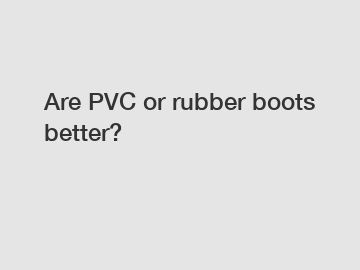Are PVC or rubber boots better?
When it comes to choosing the right boots for your outdoor activities, the debate between PVC and rubber boots can leave you feeling a bit overwhelmed. Both materials have their own set of pros and cons, making it difficult to determine which is better. In this blog, we will break down the differences between PVC and rubber boots to help you make the best decision for your needs.
PVC boots, also known as polyvinyl chloride boots, are a popular choice for those looking for an affordable and durable option. These boots are made from a synthetic plastic material that is known for its resistance to abrasion, chemicals, and oils. This makes PVC boots ideal for working in harsh environments where exposure to hazardous materials is a concern. Additionally, PVC boots are lightweight and easy to clean, making them a practical option for those who need a reliable and low-maintenance footwear solution.
On the other hand, rubber boots are a classic choice for outdoor enthusiasts who value comfort and flexibility. Made from natural rubber, these boots offer superior waterproofing capabilities and supreme comfort. Rubber boots are also known for their insulating properties, making them an excellent choice for cold weather conditions. With a wide range of styles and designs available, rubber boots are a versatile option for those looking for both functionality and style.

When it comes to durability, both PVC and rubber boots have their own strengths. PVC boots are known for their resistance to chemical exposure and abrasions, making them a durable option for those working in industrial settings. However, PVC boots can become stiff and brittle over time, especially in extreme temperatures. On the other hand, rubber boots are more flexible and resistant to cracking, making them a long-lasting choice for outdoor enthusiasts who require reliable footwear for their adventures.
In terms of comfort, rubber boots are often preferred for their cushioning and support. The natural rubber material used in these boots conforms to the shape of the foot, providing a comfortable and snug fit. Additionally, rubber boots typically have better breathability compared to PVC boots, making them a great option for all-day wear. On the other hand, PVC boots may not offer the same level of comfort due to their stiffer construction. However, some PVC boots come with additional features such as padding and insulation to enhance comfort.
When it comes to style, rubber boots have the upper hand with a wider range of colors, patterns, and designs available. From traditional rain boots to trendy Chelsea boots, rubber boots offer plenty of options to suit your personal style. PVC boots, on the other hand, tend to have a more utilitarian appearance, focusing on functionality rather than fashion. However, some brands have started to incorporate stylish elements into PVC boots to appeal to a wider audience.
Ultimately, the choice between PVC and rubber boots comes down to your specific needs and preferences. If you work in an industrial setting or require footwear that can withstand harsh chemicals and oils, PVC boots may be the better option for you. On the other hand, if you are an outdoor enthusiast looking for comfortable and versatile footwear, rubber boots may be the way to go.
In conclusion, both PVC and rubber boots have their own set of advantages and disadvantages. It is important to consider your specific needs, such as durability, comfort, and style, when choosing between the two materials. Whichever option you choose, investing in a high-quality pair of boots will ensure that your feet are protected and supported during all of your outdoor adventures.
Contact us to discuss your requirements of food processing boots, pvc boots manufacturer, eva sole. Our experienced sales team can help you identify the options that best suit your needs.

Comments